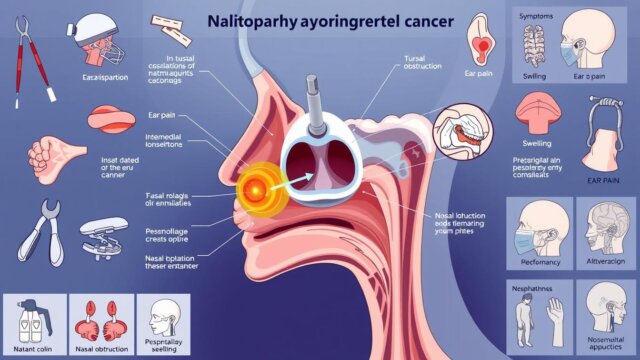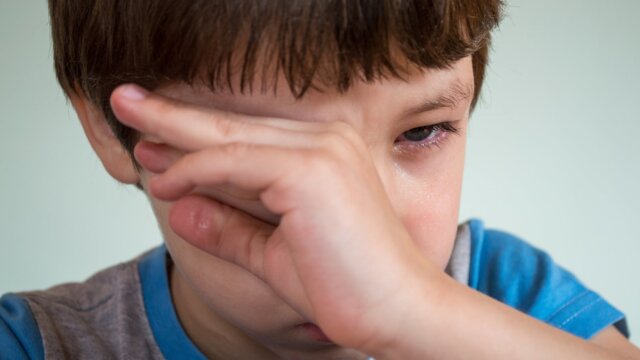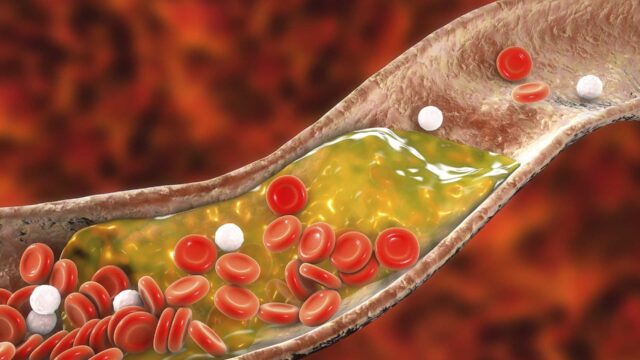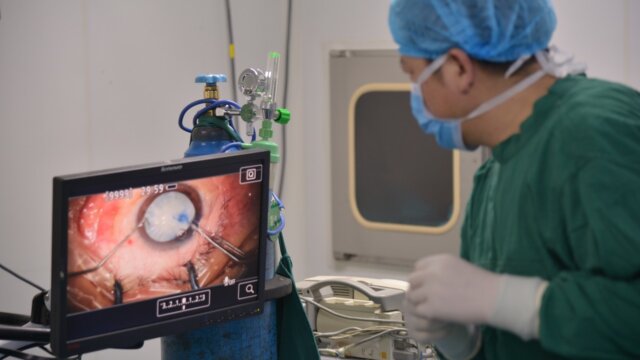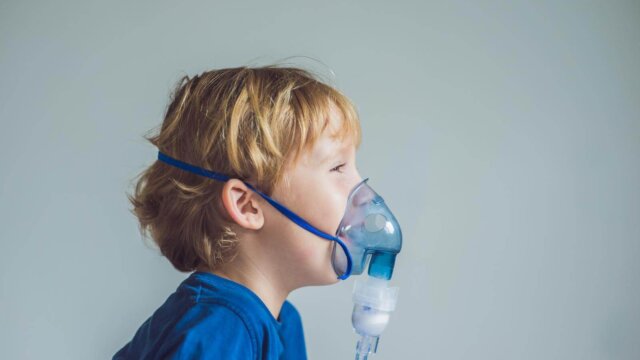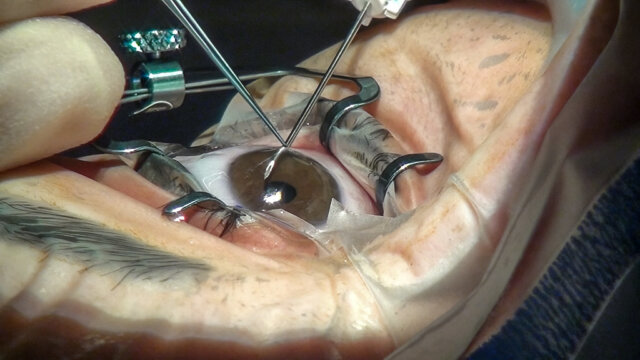FTC disclaimer: This post may contains affiliate links and we will be compensated if you click on a link and make a purchase.
Over 22 million Americans have sleep apnea, but 80% of those with serious cases don’t know they have it. This serious sleep issue means you stop breathing many times while you sleep. If not treated, it can cause many health problems.
It’s important to know about sleep apnea’s types, causes, symptoms, and treatments. This guide will help you understand sleep apnea better. It will show you how to get better sleep and stay healthy.
Key Takeaways
- Sleep apnea is a common sleep disorder that affects many Americans, often unnoticed.
- There are three main types: obstructive sleep apnea (OSA), central sleep apnea (CSA), and complex sleep apnea syndrome.
- Being overweight, older, or having a family history can make you more likely to get sleep apnea.
- To diagnose it, you usually need a sleep study. Treatment can include changing your lifestyle or using devices like CPAP machines and oral appliances.
- If not treated, sleep apnea can lead to high blood pressure, heart issues, and a higher risk of accidents.
Learning about sleep apnea and getting treatment can help you sleep better. It can also lower your risk of health problems. This means you can live a healthier and happier life.
What is Sleep Apnea?
Sleep apnea is a sleep disorder in which you stop breathing many times while you sleep. These stops can last a few seconds to a few minutes and can happen up to 30 times an hour. This means your blood doesn’t get enough oxygen, messing up your sleep.
There are three main types of sleep apnea: obstructive, central, and complex sleep apnea. If you stop breathing 5 to 15 times an hour, you might have mild sleep apnea. If it’s between 15 and 39 times, it’s moderate. If it’s over 30 times, it’s severe.
People with sleep apnea are twice as likely to die suddenly than those without it. If not treated, it can lead to heart disease, stroke, and other health issues. If you think you might have sleep apnea, you should see a doctor.
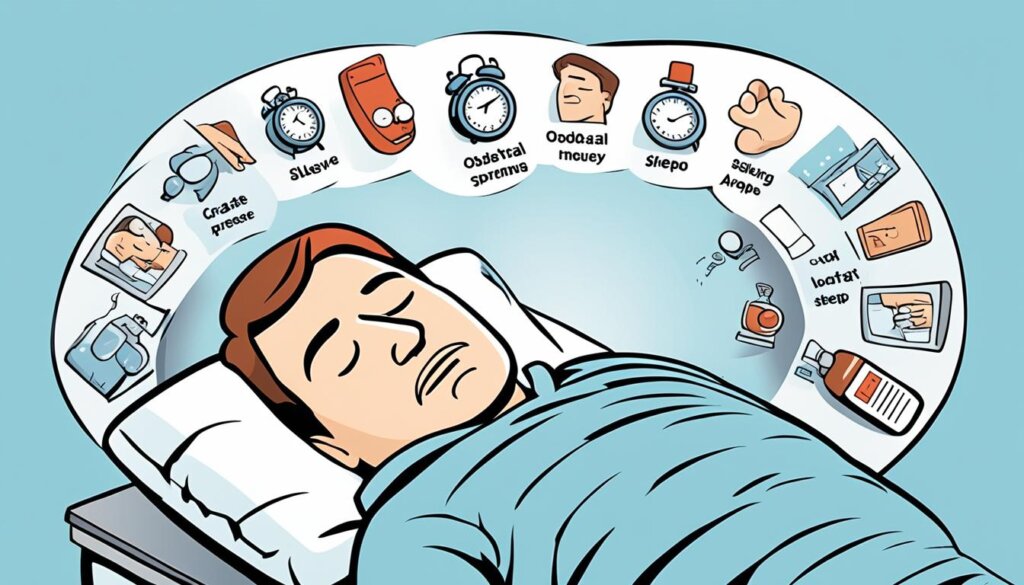
“Sleep apnea is a common sleep disorder that can have serious health consequences if left untreated. It’s important to recognize the symptoms and seek medical attention for proper diagnosis and treatment.”
Types of Sleep Apnea
Sleep apnea is a sleep disorder that affects millions of Americans. It has three main types: obstructive sleep apnea (OSA), central sleep apnea (CSA), and complex sleep apnea syndrome.
Obstructive Sleep Apnea (OSA)
OSA is the most common type, affecting up to 22% of men and 17% of women. It occurs when the throat muscles relax too much, blocking or narrowing the airway during sleep.
This makes breathing stop and start again many times during the night.
Central Sleep Apnea (CSA)
CSA is less common. It happens when the brain doesn’t tell the muscles to breathe, leading to short pauses in breathing at night. It can be caused by heart failure or stroke.
Complex Sleep Apnea Syndrome
Complex sleep apnea is a mix of OSA and CSA. It starts when someone gets central sleep apnea after being treated for OSA. This treatment might include CPAP therapy.
Knowing the type of sleep apnea is key to getting the right treatment. Being overweight, having high blood pressure, or physical issues in the nose or throat can increase the risk.
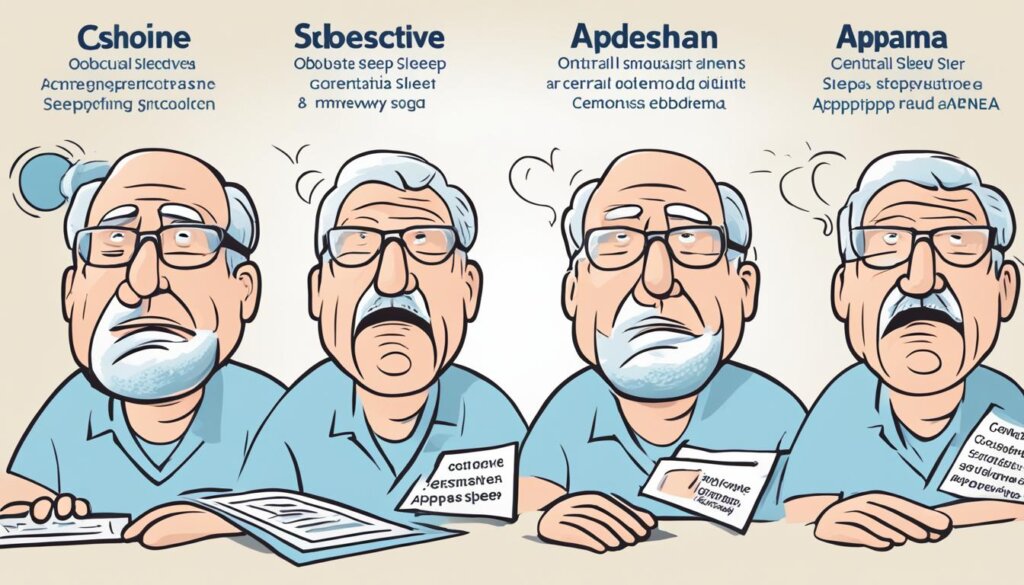
“Sleep apnea is more common as individuals get older, and it is more prevalent in men than in women.”
Causes of Sleep Apnea
Sleep apnea is a common sleep issue with different causes for each type. Knowing the causes helps with diagnosis and treatment.
Obstructive Sleep Apnea Causes
Obstructive sleep apnea (OSA) is the most common type, affecting 4%- 9% of adults and over 10% of those over 65. It’s caused by being overweight and having fat around the airway, narrow airways, big tonsils, or a family history of sleep apnea. Gaining 10 pounds can make OSA six times more likely. Men with necks over 17 inches and women over 15 inches are at higher risk.
Central Sleep Apnea Causes
Central sleep apnea (CSA) is less common than OSA. It’s linked to heart or brain issues and opioid pain meds. CSA happens when the brain doesn’t control breathing right during sleep.
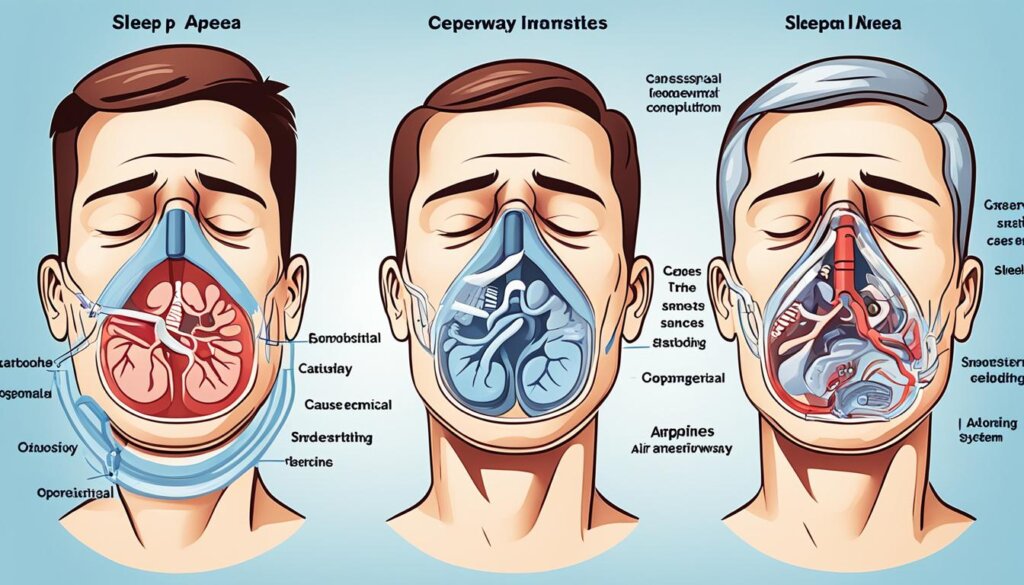
Knowing what causes each type of sleep apnea helps doctors give the right treatment.
Obstructive Sleep Apnea Causes | Central Sleep Apnea Causes |
|---|---|
|
|
“Understanding the causes of sleep apnea is the first step in providing effective treatment and improving the quality of life for those affected by this sleep disorder.”
Sleep Apnea Symptoms
If you’re having trouble sleeping because of sleep apnea, you might notice some signs that affect your daily life. One big sign is loud, constant snoring. This happens when your airway keeps getting blocked while you sleep, making you wake up gasping or choking.
People with sleep apnea often feel very tired during the day, even after sleeping well. This tiredness can make it hard to focus, leading to mood swings and irritability. You might also wake up with a dry mouth or headaches because your sleep was broken.
- Loud, chronic snoring
- Episodes of breathing cessation during sleep
- Gasping or choking sounds during sleep
- Dry mouth upon waking
- Morning headaches
- Excessive daytime sleepiness
- Difficulty concentrating
- Irritability
Not everyone with sleep apnea shows the same symptoms; some might not even know they have it. If you see any of these signs, seeing a doctor for a check-up and treatment is key.
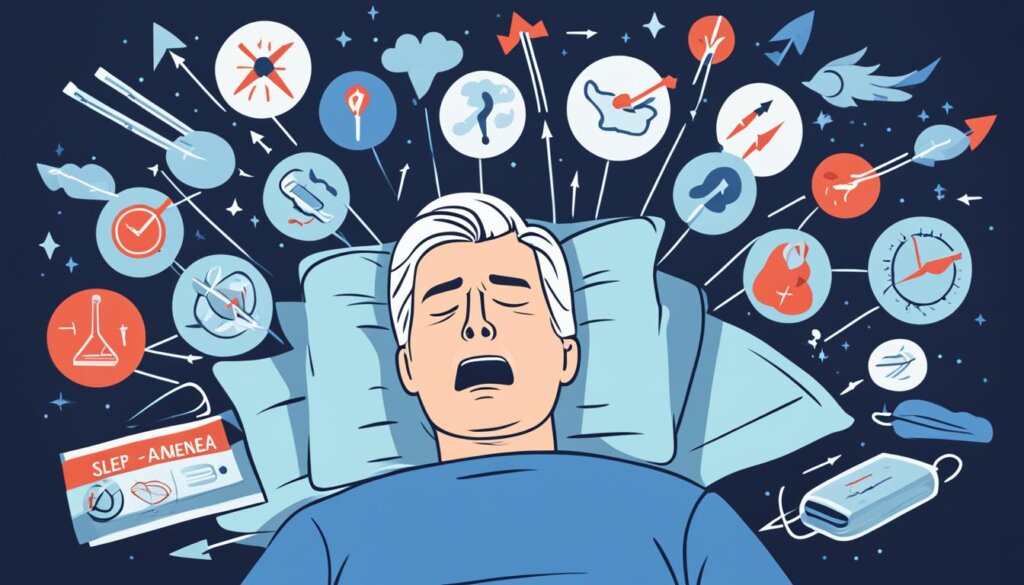
If sleep apnea is not treated, it can lead to serious health issues like high blood pressure, heart disease, stroke, diabetes, and headaches. Catching and treating these symptoms early can stop these serious health problems.
“Sleep apnea is far more common than previously thought, and it can occur at any age, but the risk increases with age.”
Risk Factors for Sleep Apnea
Sleep apnea is a chronic sleep disorder that affects many people. To prevent and manage it, it’s important to know the risk factors. Factors like being overweight, having certain body shapes, and having a family history can increase the risk.
Being overweight is a big risk factor for sleep apnea. It affects over 20 percent of obese people but only about 3 percent of those who are normal weight. Gaining just 10% of your weight can raise your risk sixfold. If your neck is over 17 inches (43 cm) for men or 15 inches (38 cm) for women, you’re more likely to get sleep apnea.
- Older age: Sleep apnea is more common in older adults. About 4%-9% of middle-aged people and over 10% of those over 65 have it.
- Gender: Men are up to four times more likely to have sleep apnea than women. However, women are more likely to get it during pregnancy and after menopause.
- Family history: About 25%-40% of people with sleep apnea have family members with it, showing it might run in the family.
- Ethnicity: Some ethnic groups, like African Americans, Hispanics, and Pacific Islanders, get sleep apnea more often than whites.
- Underlying medical conditions: Sleep apnea is often linked to heart disease, high blood pressure, diabetes, and neurological disorders.
- Lifestyle factors: Drinking alcohol, taking sedatives and tranquilizers, and smoking can raise the risk of sleep apnea.
Knowing these risk factors helps identify those at high risk for sleep apnea. It allows for early action to prevent or manage it. Early treatment can greatly improve life quality and lower health risks.
“Losing weight can either completely cure sleep apnea or make it less severe.”
Diagnosing Sleep Apnea
Doctors start by asking about your health history and symptoms. They might suggest a sleep study. This can be done at a sleep clinic or at home with a portable device.
A polysomnogram is a detailed sleep study. It checks heart rate, lung activity, brain waves, and breathing. This helps determine how severe and what type of sleep apnea you have. Home tests are another way to check for sleep apnea. They look at heart rate, oxygen levels, airflow, and breathing patterns.
You might be told not to take certain medicines for a sleep study. It’s also best to avoid caffeine and alcohol on the test day. The test uses sensors to record your sleep activities. This includes brain waves, muscle and eye movements, heart rate, and breathing.
After the test, a sleep specialist will review the data to determine whether you have sleep apnea, how bad it is, and what type it is. This information will help create a treatment plan.
Getting an accurate diagnosis is key to managing sleep apnea. By doing a sleep study, you learn more about your sleep. This helps you and your doctor find the right treatment.
Treatments for Obstructive Sleep Apnea
Obstructive sleep apnea (OSA) is a common sleep issue that needs good treatment to ease symptoms and prevent health problems later. There are two main ways to handle OSA: positive airway pressure devices and oral appliances.
Positive Airway Pressure Devices
Positive airway pressure (PAP) devices are the top choice for OSA treatment. They send air pressure to keep the airway open while you sleep. There are three main types:
- Continuous Positive Airway Pressure (CPAP) – Gives a steady air pressure.
- Bilevel Positive Airway Pressure (BiPAP) – Higher pressure when breathing in and lower when breathing out.
- Automatic Positive Airway Pressure (APAP) – Changes air pressure based on how you breathe.
Oral Appliances
Oral appliances are dental devices made just for you. They move your jaw or tongue forward to stop your airway from blocking during sleep. They can be a good choice instead of PAP therapy for mild to moderate OSA.
“Obstructive sleep apnea is a serious sleep disorder that can have significant consequences if left untreated. Seeking proper medical care and using the appropriate treatment options are crucial for managing this condition and improving overall health and well-being.”
Using PAP devices or oral appliances helps fix the root of OSA. This leads to better sleep, less daytime tiredness, and a lower risk of health problems.
Treatments for Central Sleep Apnea
Central sleep apnea (CSA) is a serious sleep issue that needs special care. It happens when the brain doesn’t tell the muscles to breathe. Luckily, there are good ways to help people with CSA.
Adaptive Servo-Ventilation (ASV)
Adaptive Servo-Ventilation (ASV) is a key treatment for CSA. It watches how you breathe and changes air pressure to help you breathe right. Studies show ASV works better than CPAP for many with CSA.
Medications
Medicines can also help with CSA. Some sleeping pills or stimulants might work, even if they’re not made for this. For some, acetazolamide helps by making breathing stronger.
Other ways to treat CSA include using oxygen, phrenic nerve stimulation, or surgery. The best treatment depends on why you have CSA and how bad it is. It’s important to work with a sleep expert to find the right treatment.
Dealing with central sleep apnea can be tough, but treatments like ASV and certain medicines offer hope. People with CSA can improve their sleep and health with the right medical care and therapy.
Sleep Apnea and Lifestyle Changes
People with sleep apnea can make simple changes to feel better. Losing weight is key, especially for obese adults, as it clears the airways. Sleeping on your side instead of your back helps, too. Also, cutting down on alcohol and sedatives helps by keeping throat muscles strong.
Dealing with nasal congestion or allergies can also help. Regular exercise boosts oxygen levels and improves sleep quality. Studies show that exercise helps people with sleep apnea sleep better and feel more energetic.
Drinking alcohol and smoking makes sleep apnea worse. Alcohol makes the airway muscles relax and can lead to weight gain. Smoking also lowers sleep quality and harms overall health. Some medicines can make sleep apnea worse, too. Be careful with over-the-counter sleep aids to avoid hiding breathing problems.
Changing how you sleep, like using an oral appliance, can help with mild sleep apnea. Exercise, relaxation, and a regular sleep schedule can also help manage it. Avoid eating big meals, caffeine, and spicy foods before bed to prevent heartburn and sleep apnea symptoms.
Untreated sleep apnea can lead to weight gain and mental health problems like depression. Making these changes can greatly improve life for those with sleep apnea.
“Lifestyle changes can be a powerful first line of defense against sleep apnea, especially in mild cases. By making simple adjustments to your daily routine, you can take an active role in managing your condition and improving your overall health and well-being.”
It is important to be consistent and take a whole-body approach when making these changes. With the right steps and a commitment to health, you can manage your sleep apnea, which will lead to better sleep and daily life.
Complications of Untreated Sleep Apnea
Not treating sleep apnea can cause serious health problems. Studies show a strong link between it and high blood pressure, heart disease, and type 2 diabetes. It can also lead to feeling tired all day, poor thinking skills, and heart rhythm issues.
Not treating sleep apnea can have big effects. The most common type, obstructive sleep apnea, raises the risk of heart and blood vessel problems, dementia, and stroke. It can also cause mouth health issues like tooth decay, teeth grinding, and jaw pain.
- Daytime fatigue and impaired cognitive function
- High blood pressure and increased risk of heart disease, heart attack, and stroke
- Type 2 diabetes
- Metabolic syndrome
- Irregular heartbeats
- Nonalcoholic fatty liver disease
- Complications with anesthesia and surgery
However, there are ways to treat sleep apnea, such as CPAP machines and special mouthpieces. Getting the right treatment can prevent serious health issues and make you feel better overall.
Sleep Apnea in Children
Sleep apnea is a condition where a child stops breathing during sleep. It can happen in kids, too, but it shows up differently than in grown-ups. It’s a sleep disorder that blocks a child’s airway during sleep, happening frequently each night.
Kids with sleep apnea might act differently, do poorly in school, feel tired during the day, breathe through their mouths, sweat a lot at night, and sleep in odd ways. It can cause problems with learning, behavior, growth, and the heart if not treated. Kids are more likely to have it if their family has it, they’re overweight or they have certain health issues.
Adults get tired during the day, while kids act out more. In kids, big tonsils and adenoids often cause sleep apnea. In adults, being overweight is a big reason.
If a child snores a lot, sleeps poorly, feels tired, or shows other signs, they should see a sleep specialist. These specialists use sleep studies to check for sleep problems like sleep apnea.
Treatments for kids with sleep apnea include nasal sprays, surgery, or using a CPAP machine. CPAP machines help keep airways open during sleep, especially for kids who are overweight.
Catching and treating sleep apnea early is important to help kids grow and learn well. Not getting help can lead to kids feeling tired and acting out in the mornings.
Pediatric Sleep Apnea Statistics | Details |
|---|---|
Incidence of Pediatric OSA | It peak between 2 and 8 years of age due to the increased growth of tonsils and adenoids relative to the size of the upper airway. |
Risk Factors for Early-onset OSA | Prematurity, Down syndrome, African American race, and daycare attendance. |
Gender Differences in OSA Risk | Boys are at increased risk after puberty, while prepubertal risk is equal among boys and girls. |
Childhood Obesity and OSA | For every kg/m^2 increase in BMI above the 50th percentile, there is a 12% increase in the risk for OSA. |
OSA Prevalence in Preterm Children | As high as 9.4% of school-aged children who were born prematurely were diagnosed with OSA. |
Pediatric OSA Severity Classifications | Mild (1-4.9 events/hour), Moderate (5-9.9 events/hour), Severe (>9 events/hour). |
In summary, sleep apnea in children shows up differently and needs early treatment to avoid serious problems. Getting help for sleep apnea signs is key for kids’ health and happiness.
Sleep Apnea and Overall Health
Sleep apnea is a common sleep issue that affects your health and well-being. Studies have shown it can harm your heart and lead to serious health problems.
Not treating sleep apnea can make you more likely to get heart disease, COPD, or type 2 diabetes. It can also make you more resistant to insulin, which is a step towards type 2 diabetes.
Sleep apnea is linked to metabolic issues like metabolic syndrome. This includes high blood pressure, high bad cholesterol, high blood sugar, and a big waist. It can also make asthma and COPD worse, making breathing and exercising hard.
Sleep apnea affects more than just your heart and metabolism. It can make heartburn and GERD worse, hurting your sleep. It can also cause numbness and tingling, which are neurological problems.
This condition can also hurt your sex life. It can lower your desire for sex, cause erectile dysfunction in men, and affect fertility.
Sleep apnea symptoms include a dry mouth, headaches, trouble focusing, and irritability. Using CPAP machines is key to managing sleep apnea and staying healthy.
Many people with sleep apnea don’t know they have it. Over 80% of those with serious cases haven’t been diagnosed. Finding and treating this condition is vital for your health.
Sleep Apnea Statistics | Percentage |
|---|---|
Prevalence of obstructive sleep apnea (OSA) in men | 34% |
Prevalence of obstructive sleep apnea (OSA) in women | 17% |
Increased risk of abnormal heart rhythms and cardiovascular disease in untreated sleep apnea | 2-4 times higher |
Increased risk of heart failure in untreated sleep apnea | 140% |
Increased risk of coronary heart disease in sleep apnea | 30% |
Increase in sleep apnea risk with a 10% increase in body weight | 6-fold |
It’s important to understand how sleep apnea affects health. Proper diagnosis and treatment can greatly improve your health and well-being.
Conclusion
Sleep apnea is a serious sleep issue that can harm your health if not treated. You should see a doctor if you snore loudly, feel tired all day, or stop breathing while sleeping. There are many ways to treat sleep apnea, like changing your lifestyle or using special devices. It’s key to get help to keep you healthy and happy.
Studies show that treatments for sleep apnea help with feeling too sleepy and reduce the severity of the condition. Using a device called CPAP was found to work best. Sticking with your treatment is important for it to work well and save money. Having support from others helps you stick with your treatment.
Many people have sleep apnea, and it can make you more likely to get high blood pressure. If not treated, it can lead to more health problems, like car accidents or heart issues. Getting the right treatment can help you stay healthy and feel good.
FAQ
What is sleep apnea?
Sleep apnea is a serious sleep issue in which breathing stops and starts repeatedly. It can make you feel tired all day, raise your blood pressure, and cause heart problems. If not treated, it can lead to serious health issues.
What are the main types of sleep apnea?
There are three main types of sleep apnea: obstructive sleep apnea (OSA), central sleep apnea (CSA), and complex sleep apnea syndrome.
What causes the different types of sleep apnea?
Obstructive sleep apnea (OSA) occurs when the throat muscles relax and block the airway. Central sleep apnea (CSA) occurs when the brain doesn’t send the right signals to breathe.
What are the symptoms of sleep apnea?
Symptoms include loud snoring, stopping breathing during sleep, and gasping sounds. You might also have a dry mouth, headaches in the morning, feeling very sleepy, trouble focusing, and irritability.
What are the risk factors for sleep apnea?
Being overweight, having a big neck, having certain body shapes, being a man, getting older, having a family history, drinking alcohol or taking sedatives, smoking, having a stuffy nose, and some medical conditions increase your risk.
How is sleep apnea diagnosed?
Doctors will ask about your health history and symptoms. They might also do a sleep study to check your body’s functions while you sleep.
What are the treatments for obstructive sleep apnea (OSA)?
Treatments for OSA include using devices like CPAP, BiPAP, and APAP. You might also use oral appliances that keep your jaw or tongue forward.
What are the treatments for central sleep apnea (CSA)?
Treatments for CSA include using ASV devices and some medications. However, these treatments do not have official approval.
How can lifestyle changes help manage sleep apnea?
Changing your lifestyle can help. Lose weight if you’re overweight, avoid sleeping on your back, cut down on alcohol and sedatives, and treat any nasal congestion or allergies.
What are the health complications of untreated sleep apnea?
Without treatment, sleep apnea can cause serious health problems. These include feeling tired all day, high blood pressure, heart disease, type 2 diabetes, and more.
Can children also experience sleep apnea?
Yes, kids can get sleep apnea, too. It can be caused by big tonsils and adenoids, which can be treated to help manage the symptoms.

